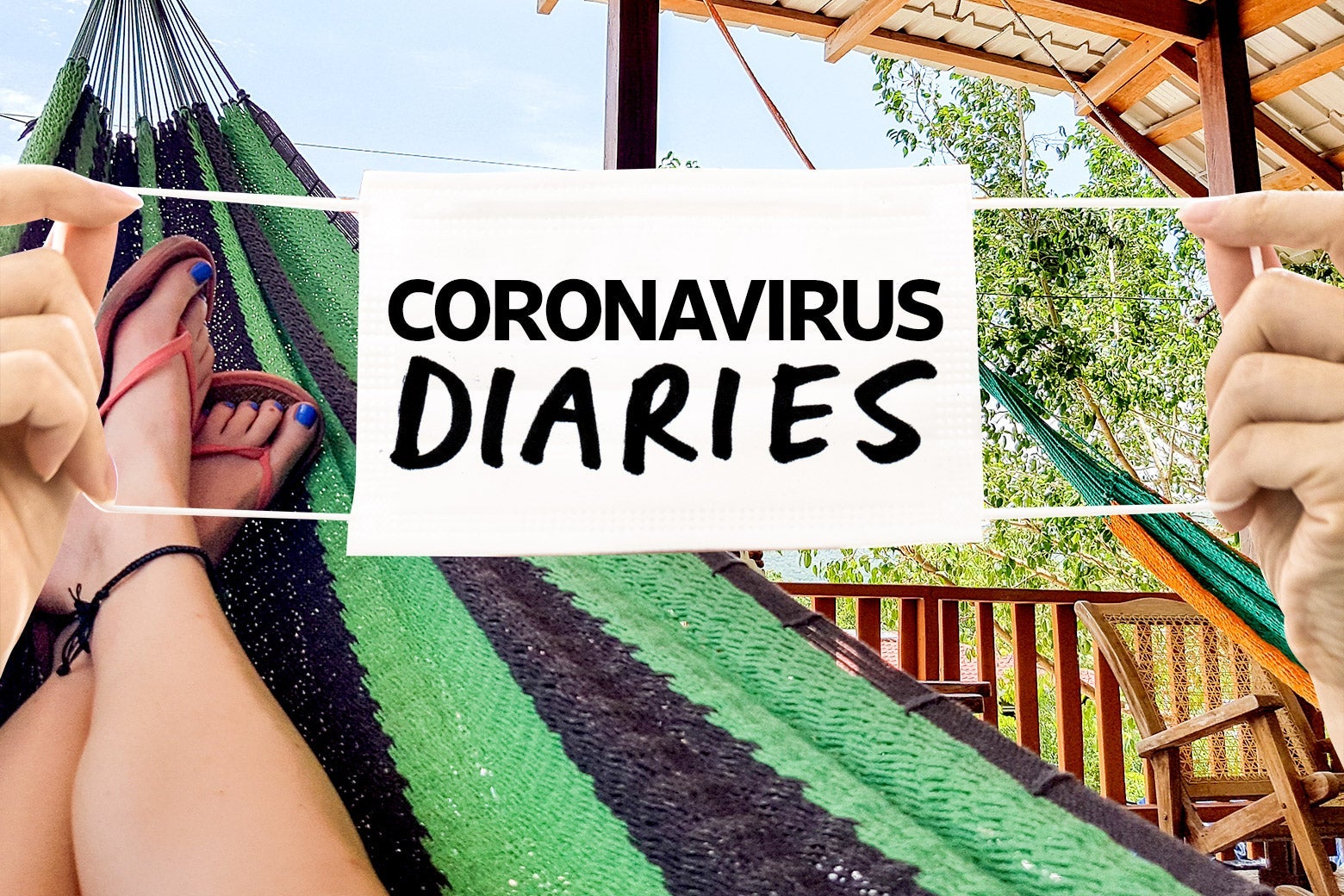
Photo illustration by Slate. Photo by Katrin Sauerwein/iStock/Getty Images Plus.
I had planned to spend two weeks here in Antigua, Guatemala. I’ve been traveling around Latin America for two and a half years, and every so often, I find a place with the right mix of climate and food and culture and nature and stick around for more than a few days. But I couldn’t get enough of days spent wandering Antigua’s picture-perfects streets—corrugated iron roofs covered in S-shaped terracotta tiles, houses painted orange and yellow and sky blue, too-small sidewalks hugging bumpy cobblestones—and nights spent watching bright red lava spill down the sides of the Volcan de Fuego. For over seven weeks, I kept extending my stay.
I extended it right into Guatemala’s complete border shutdown.
On March 16, Guatemala announced it would shut its borders at midnight the next day. No one in, no one out. Neighboring countries like Honduras and El Salvador, where I’d planned to go next, had already closed, limiting land routes out of the country.
Immediately, the European backpackers and Canadian tour guides staying in the hostel I’m living and volunteering in poured out of their rooms to cluster at the reception desk, where the wi-fi is strongest. I listened to them begging and bartering with airlines, trying to get their flights moved up to leave immediately. Ubers started arriving en masse to bring them to the airport.
I decided to stay.
Inertia impacted my decision. Yes—I’ve been traveling for a while and would like to keep doing it, and I’d rather shelter in place for a few weeks (though I think my calculus may change if it becomes a few months or years, as is looking likely) and continue onwards than go home right now.
But also: I’m not sure I want to go home at all. Not while the coronavirus is spreading through all 50 states, and not while the United States is bungling its response.
Two days before Guatemala even had a case of coronavirus, they’d closed their borders to visitors from Europe, Iran, China, and South Korea. The day the first case was announced, they expanded the ban to the U.S. and Canada, and three days later, they closed their borders to everyone. They started building a care center for COVID-19 patients in the country’s capital, Guatemala City, and announced aggressive containment measures that include the suspension of school, religious services, sporting events, public transportation, all non-essential work, all public meetings or gatherings, jail visits, and visits to the elderly in hospitals. They closed all commerce (including restaurants and bars) with the exception of grocery stores, gas stations, banks, phone companies, and cleaning goods stores. They instituted a curfew and asked everyone to stay at home.
In the same time period—March 11 to March 16—Donald Trump was giving an error-ridden Oval Office address that praised his administration’s slow response, blaming the Obama administration for the CDC’s slowness in getting coronavirus tests out, and claiming that the U.S. has the “greatest healthcare system…anywhere in the world.” (A demonstrably false claim, like so many of the things that come out of his mouth.) All while seemingly no one who wasn’t in the NBA could get their hands on a test and the U.S. confirmed more cases each day than the day before.
Watching the news updates trickle in, I realized I felt safer being in a foreign country, on a tourist visa that expires in a month, without health insurance beyond travel insurance coverage, surrounded by other locked-in travelers I’ve known for a matter of days, than I would feel at home. I anticipate that I’ll continue feeling this way until one of two things happens: 1) the virus explodes here and overwhelms Guatemala’s healthcare system, or 2) the feeling in the hostel, where we’re all co-living in a dorm room with nothing but cheery yellow curtains for privacy, turns from summer-camp optimism to Big Brother anxiety.
The day before Guatemala closed its borders, a traveler from California arrived at our hostel at 3 a.m. She’d registered as staying here when she arrived at the airport, and officials told her she needed to check in and isolate herself until the Ministry of Health could come by and confirm that she wasn’t sick. I expected she’d be there for days, waiting for a bureaucratic response. Imagine my surprise when an official showed up at noon, examined her, and cleared her to come out of isolation.
Guatemala is a developing country with a fraction of the resources that the U.S. has—the per capita GDP is $4,891, compared to the U.S.’s $67,063—but its response to this crisis has been much faster and more confidence-inducing than my home country’s. I hope it works. Tourism is a major part of Guatemala’s economy, and in a country where many people live on a day-to-day or week-to-week basis, weeks and months of empty streets and shuttered stops will have a devastating effect.
I went to the grocery store a few days ago to stock up on pasta and produce and bags of refried beans. Some shoppers were wearing surgical masks or had scarves tucked against their faces, and the rice was going fast, but it was nowhere near an apocalyptic scene. There was plenty of toilet paper. A recording played over and over: “Shop calmly. We are here to help.”
Readers like you make our work possible. Help us continue to provide the reporting, commentary and criticism you won’t find anywhere else.
Join Slate Plusfrom Slate Magazine https://ift.tt/2vKMSZw
via IFTTT
沒有留言:
張貼留言